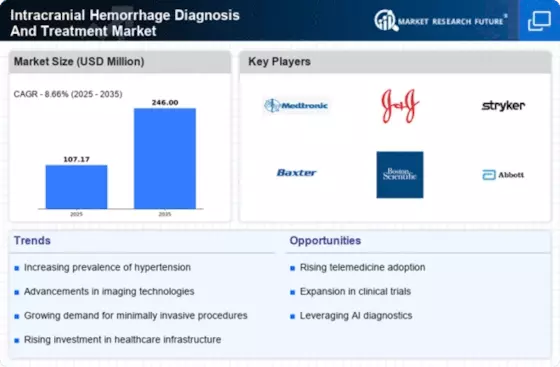The South America Intracranial Hemorrhage Diagnosis and Treatment Market is characterized by a dynamic competitive landscape, influenced by advancements in medical technologies and an increasing prevalence of cerebrovascular disorders.
This market revolves around the diagnosis and treatment of various forms of intracranial hemorrhage, a critical medical condition that necessitates timely interventions. The players in this market focus on innovative solutions, aiming to enhance patient outcomes while addressing diverse healthcare needs across the region.
Competitors are involved in the development of advanced imaging modalities, minimally invasive surgical techniques, and efficient medication therapies.
Consequently, they continually adapt their strategies to maintain market relevance in a landscape defined by technological evolution and regulatory changes, while also responding to the growing demand for effective treatment options from healthcare providers and patients alike.
Medtronic stands out as a major player in the South America Intracranial Hemorrhage Diagnosis and Treatment Market, well-regarded for its robust portfolio of medical devices and solutions tailored for neurological disorders.
The company's product offerings include advanced imaging systems, neurovascular devices, and surgical instruments designed for precise intervention in cases of intracranial hemorrhage. Medtronic benefits from its strong brand reputation, established distribution networks, and a commitment to innovation, allowing it to meet the region's healthcare challenges effectively.
The company's focus on research and development has positioned it favorably, as it consistently introduces new products that align with the evolving needs of healthcare professionals and patients. Additionally, Medtronic’s collaborative approach with local healthcare institutions aids in enhancing its market presence and reinforces its commitment to improving patient care in South America.
Terumo is another significant entity in the South America Intracranial Hemorrhage Diagnosis and Treatment Market, recognized for its commitment to delivering high-quality medical devices and solutions.
The company offers a range of products including vascular intervention devices, which are crucial for the diagnosis and treatment of intracranial hemorrhages. Terumo has established a strong market presence through its strategic partnerships and focus on enhancing access to advanced medical technologies across South America.
The company emphasizes innovation and quality, ensuring that its products meet stringent regulatory standards while addressing specific regional healthcare needs. Terumo's strengths lie in its continuous investment in research and development, which has led to the introduction of cutting-edge products that improve procedural efficiencies.
Furthermore, Terumo has engaged in various collaborations and potential mergers within the region to enhance its market position, driving growth in its capabilities to meet the increasing demands of intracranial hemorrhage treatment and diagnosis.














Leave a Comment